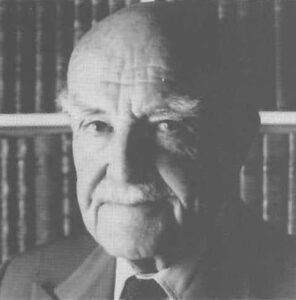The death on Sunday 15 April, Easter Sunday, of Brigadier Cuthbert Goulburn DSO, at the age of 83, had removed from us one of the best known and best-loved members of the regimental family.

A devout Christian, he passed away coming back from church to his home at Ewdness in Shropshire, after morning service on Easter Day, in the company of two who had for many years devotedly looked after him.
Cuthy (as he was always called among family and friends) Goulburn went from Eton to Trinity College Cambridge, where he took a degree in Natural Sciences and was commissioned into the Eighth King’s Royal Irish Hussars on 31 August 1929, with two and a half years’ seniority on account of his degree.
In December 1933 he sailed for Egypt with the Regiment, which was to become part of the Cairo Cavalry Brigade, stationed at Abbassia, but two years later he was sent back sick to the UK, to return to the Regiment, now recently mechanized, as a Captain in 1936.
After regimental service in troubled Palestine he went into staff employment and after the outbreak of World War Two became, in June 1940, Brigade Major to the 7th Armoured Brigade in Egypt.
A year later he was posted to India and then instructed for two years at the Staff College in Quetta, returning to Egypt as the Regiment’s second in command, in July 1942.
He found his Regiment reduced by the fighting in the desert to little more than one squadron.
Only the determined efforts of a devoted man could prevent the removal of the Regiment from the active list into suspended animation, but he succeeded in rebuilding it and brought it back to Britain in December 1943, almost exactly ten years after its move, as a horsed regiment, out to Egypt, to take it, as the Commanding Officer now of a tank unit, into the invasion of North-Western Europe.
After much fighting, in which Lt Colonel Goulburn was awarded the DSO, he relinquished command in January 1945, to be posted back as Commanding Officer for another three years in 1946, before moving out to Egypt again, this time as Military Attache and as a local Brigadier, in 1950.
Goulburn’s time as CO of the 8th KRI Hussars — two years in war and three in peace — did a very great deal to stabilise and reorganise his beloved Regiment and put it into the order in which it behaved with such distinction in Korea.
As Military Attache in Cairo, he occupied a key position in a troubled time. He then went on to be Military Attache in Madrid, a post he filled admirably until he left it at the turn of the year 1957/58 to retire from the service.
His life thereafter, never unmindful of his deep devotion to the Regiment, was lived out in Shropshire, with devotion equally deep to the interests of the county and to all the people he had to deal with.
What was said in an oration at his Memorial Service on 8 June, in St Mary’s Church, Bridgnorth, is relevant:
“He immersed himself most deeply in the life of Shropshire. For nearly 20 years he was a County Councillor and there are few important committees of which he was not a member or even chairman.
He will be particularly remembered for his work, painful to him at times, in the creation of the West Mercia Police Authority, into which the then independent police force of his own Shropshire was to be merged.
The list of activities he supported is immense, from the West Midlands Sports Council, through the Victoria County History, the governing bodies of several schools, the presidency of the local St John Ambulance, the Boy’s Club, the Cricket, Hockey, Bowls, Tennis and Golf Clubs.
There were very many other causes to which he was of help.”
People were what Cuthy minded about most. In his Regiment, in war, he was known as a bold, competent, careful commander, holding the respect and affection of those in his charge. In his later life, as a landowner and local magnate in Shropshire, he was held in high regard everywhere. He will be greatly missed.
A quotation from the letter of a younger officer who served with him may not be amiss:
“Cuthy was always my hero — as a schoolboy and as a middle-aged man. I really loved him and shall miss him very much indeed. He epitomised all that was good in the classical English Gentleman.”
Cuthy Goulburn was able to find, in his Will, from not inconsiderable means, a handsome benefaction to the QRIH Benevolent Fund. He had left it £40,000.00. We are grateful, but if he had left it nothing we should love him still.


